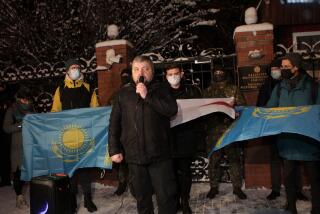Man of the People Again?
- Share via
For 60 years the name of Leon Trotsky has been anathema in the Soviet Union. Long recognized in the West for his vital role in securing first the triumph and then the survival of the Bolshevik revolution, Trotsky has been treated in his homeland as a virtual non-person, his contributions to the revolution ignored and his writings condemned and banned. Vladimir I. Lenin, in the testament that he dictated shortly before his death, called Trotsky the “most able” among his potential successors. Yet in the massive fabrication of history that took place after Josef Stalin consolidated his dictatorship and purged his opponents, Trotsky was depicted as the devil incarnate. Two generations of Russians have been taught to so regard him.
As with other things in the Soviet Union, change may be on the way. Some of Stalin’s most famous victims have lately been exonerated; now a prominent historian, Yuri Afanasyev, proposes that the false criminal charges lodged against Trotsky should be erased and that his works should be published. Afanasyev made his remarks to a news conference that was held at the foreign ministry press center--a setting that seems to suggest implicit official approval for the trial balloon that he launched.
The possibility of rehabilitating Trotsky is yet another instance of the ferment under way as a result of General Secretary Mikhail S. Gorbachev’s program of glasnost . What would it mean if Trotsky were exonerated? For the Western world the equivalent might be if English historians suddenly decided that maybe they’ve had it all wrong about poor Guy Fawkes, or if American historians concluded that Benedict Arnold really wasn’t such a bad fellow after all.
Trotsky’s principal “crime” was that Stalin saw him as his chief rival for power--a position that Trotsky reached thanks to his great intellectual and oratorical skills and because of the enormous popularity that he achieved as the creator and commander of the Red Army. Stalin cast their conflict in ideological terms. But in the main it was political, and in the end Trotsky was outpoliticked by Stalin at every turn--first losing power, then his citizenship, and finally, in exile, his life at the hands of a Stalinist assassin.
Should Trotsky be returned to his proper place in the Soviet pantheon, the official history of the revolution and the Soviet Union’s early years could not escape being rewritten--a process that would force other reputations to be re-examined. Afanasyev and those who support his proposal surely know that the first reputation most likely to be reappraised would be that of Lenin himself. Is this where things are heading? It seems inconceivable. But so for decades did any chance that Leon Trotsky might one day be spoken of with some sympathy in Moscow.
More to Read
Sign up for Essential California
The most important California stories and recommendations in your inbox every morning.
You may occasionally receive promotional content from the Los Angeles Times.













